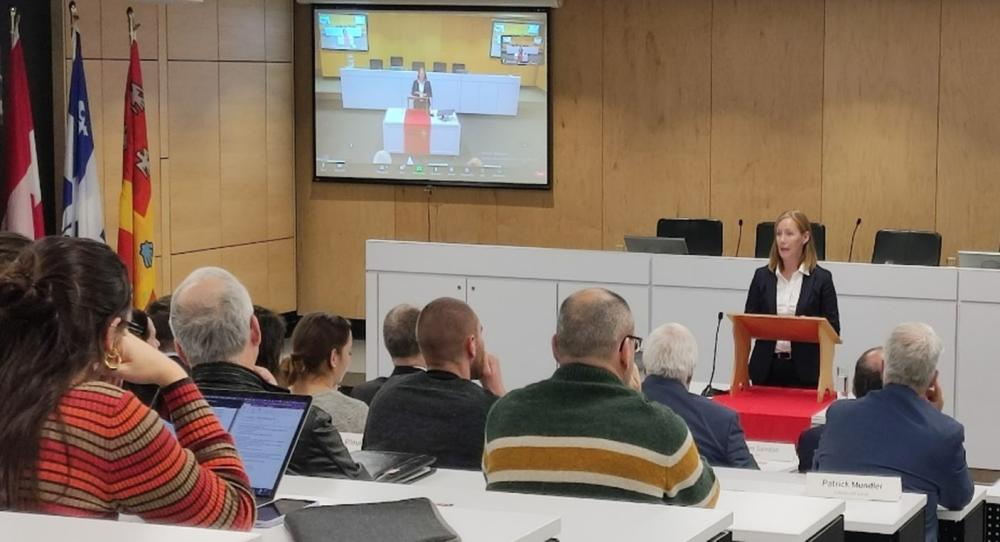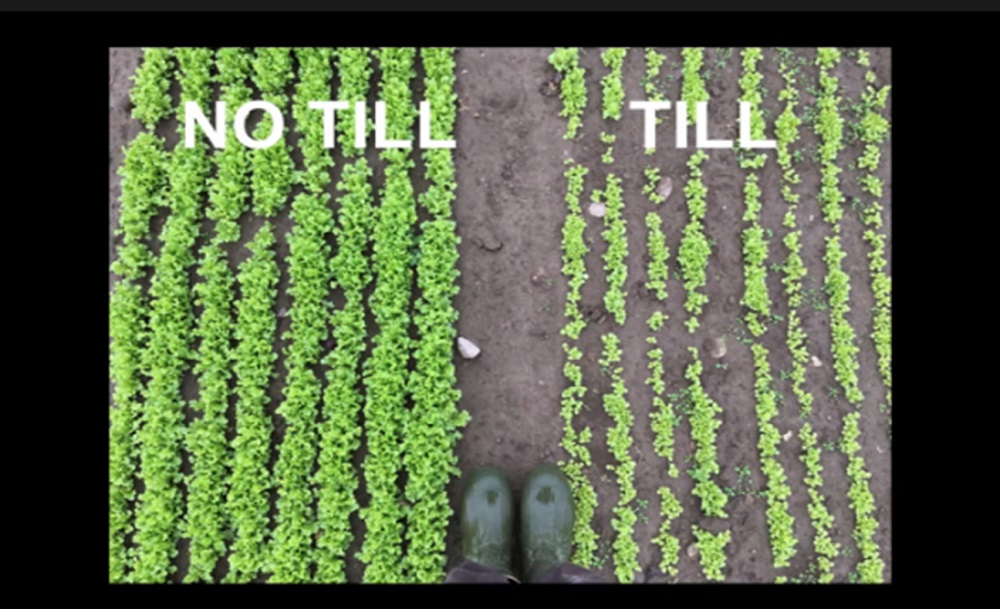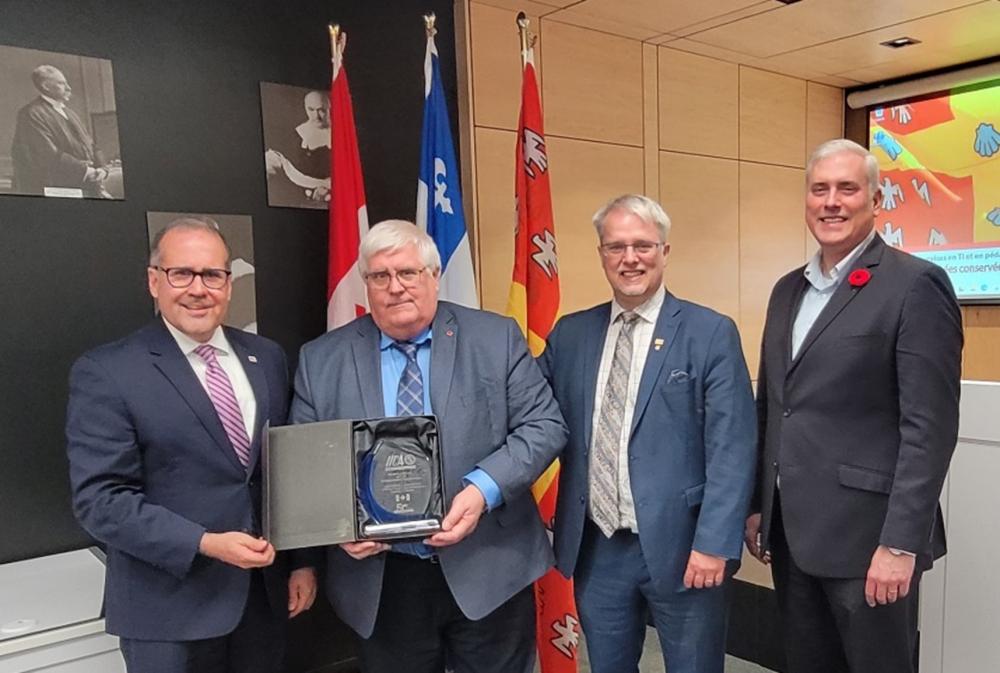A Celebration of IICA’s 50th Anniversary in Canada: Agriculture as a Vector of Change in the Transition to Sustainable Food Systems
IICA was founded in 1942 in Costa Rica. As part of the celebrations to commemorate IICA’s 80th anniversary and its 50 year presence in Canada, a workshop on "Agriculture as a vector of change in the transition to sustainable food systems" was co-hosted by Université Laval’s School of Law and its Legal Research Chair in Food Diversity and Security, in Quebec City, November 8th 2022.
Over 120 participants and VIPs took part online and in-person to celebrate the occasion, including representatives from the federal and provincial departments of agriculture, foreign affairs, academics, students, industry, farmers, and civil society. Dr. François Gélineau, the University’s Vice-Rector for International Affairs and Sustainable Development, praised the interconnectedness across the continent fostered by the hybrid model to contribute to the identification of innovative solutions for the great challenges of our time.

On the eve of the COP27 taking place in Egypt, the relevance of agriculture as a vector for the transition of food systems toward greater sustainability was the main theme of the event. In his opening remarks, Mr. Lloyd Day, IICA’s Deputy Director General, reminded the audience that agriculture is a core element of the solutions to climate change and that farmers are the foundation of any discussion on how any food system transition will take place as they grow food and care for the land. Mr. Day also stressed the need for science-based decision-making in this transition.
Scientific Perspectives from Université Laval Experts
The event provided an opportunity to share relevant scientific and experiential knowledge between food systems stakeholders and shed the spotlight on young farmers making a difference in driving the sustainable transition in agri-food systems. Professor Geneviève Parent, Head of the Legal Research Chair, spoke to the role of law as a vector of change for sustainable food systems, stressing that in order to drive and implement effective changes in food systems, that law should serve as a foundation for human rights, as an instrument for guidance and coordination, and as a tool for operationalizing sustainable food systems through sectoral laws and regulations.

Professor Lota D. Tamini, Director of the Research Centre for Environmental, Agri-food, Transport and Energy Economics, discussed both the impacts from COVID and the Ukraine war on agricultural trade and the commendable resilience of agri-food supply chains, while Professor Charlaine Bouchard, Research Chair on Smart Contracts and Blockchain, gave a glimpse of the challenges and opportunities presented by Big Data in agriculture, showcasing how the world has changed over the last 20 years thanks to the evolution of technology and digitalization. These changes come with a digital ecosystem that creates added value for farmers and can contribute to the transition to sustainable food systems while assisting with food chain traceability and transparency.
Farmers at the center of the conversation
Giving a spotlight to farmers’ experiences was one of the event’s main objectives. A panel on sustainable and equitable food system included farmer Yves Laurencelle, President of the Regional Federation of the Union of Agricultural Producers of la Côte Nord, farmer Gillian Flies, President of the Canadian Organic Growers, and Liliana Jiménez Molina, Manager of Innovation, Socio-entrepreneurial Strengthening and Women's Entrepreneurship at the National Federation of Cocoa Growers of Colombia. A group of young farm leaders, François, Julie-Ann and Sophie Blouin, founding members of the Quebec Federation of Young Farmers (FRAQ), then shared with the audience some innovative practices they employ in addition to the challenges and opportunities facing the sustainable transition of agri-food systems in their region.

Gillian Flies, who practices regenerative agriculture on her farm in Ontario, described how agriculture plays a significant role in mitigating climate change and helping Canada reach its climate commitments. She then shared some of the many benefits of regenerative agriculture, an approach that builds a sustainable agricultural future, including the use of no till, cover crops, integrated crop-livestock systems, and crop diversification, which have improved the profitability and resilience of her farm operations while sequestering carbon and reducing GHG emissions.
Liliana Jimenez shared her experience working for rural women’s rights and improving the quality of life in rural areas in Colombia. As Chair of the Board of Directors of an association of small producers, PROSOAGRO, she highlighted the importance of cooperation and associative models, as well as social strengthening and solidarity as part of the solution to mobilize farmers, rural women, and youth to overcome challenges to innovation and become entrepreneurs.
On the topic of innovation, Mr. Blouin elaborated on how he and his family have opted to leverage the potential of agri-processing for waste reduction, differentiation, added value, and overall, more sustainable farming. Defining themselves as artisans of transformation, the Blouins’ decision to focus on differentiation and processing has paid off, with the farm’s unsold or degraded fruits and vegetables processed into juices, slushies, soups, and other products that have significantly increased their profitability.
Marketing farm products featured constantly as a challenge for sustainable farmers, all of whom pressed on the need to educate consumers about the importance of choosing sustainable products and supporting farmers that engage in sustainable practices. Speakers agreed on the need for innovations in market institutions that encourage sustainable agriculture accompanied by better consumer education to drive the demand for sustainable products.
Generational renewal and youth as drivers of the sustainable transition
Another recurrent theme throughout the workshop was generational renewal as a challenge globally, featured in the shared experiences of farmers from Quebec, Ontario, and Colombia. They stressed the need to attract youth to agriculture for the survival, continuity, and future prosperity of agri-food systems and the broader sustainability of rural communities, yet they also recognized that agricultural activities have increasingly become less appealing to succeeding generations.
Recognizing the challenges for youth integration in agricultural activities, IICA’s Silvia Castellano and Carlos Ruiz, speaking from Spain and Specialists in youth and gender equity, presented IICA’s strategy to attract more youth to agriculture in the Americas, focusing on increasing training in skills and knowledge, promoting greater investment in technologies and innovation, and positioning agriculture as a key sector to face global challenges such as climate change and food security. The Quebec young farm leaders agreed that young people, having a distinctive voice and perspective, can come up with novel solutions to lead the transition to sustainable food systems.
A 50-year history of friendship and collaboration between IICA and Canada
On February 22, 1972, Canada signed the Instrument of Accession to the Convention on the Inter-American Institute of Agricultural Sciences, becoming both a member country and a strong supporter of technical cooperation assistance. Through its Canadian office in Ottawa, IICA has created critical connections with Canadian institutions and groups interested in building ties with other member nations across the Americas, and has continuously worked to promote new opportunities for collaboration.
IICA draws upon the technical capabilities and support of Canadian stakeholders to help other member states in the Americas strengthen their agricultural capacity and provide support for agricultural research and training. During the workshop, Dr. Jean-Charles Le Vallée, IICA’s Country Representative for Canada, provided a glimpse of the office’s work, through hundreds of internships, dozens of webinars, training courses, and more recently, research and training grants for animal health (African Swine Fever) through PROCINORTE, a network of national agricultural government research bodies in Canada, the U.S., and Mexico. As PROCINORTE’s Executive Secretary, the Canadian Delegation is committed to integrating regional cooperation in the northern region and contributing to knowledge transfer to other member countries in Latin America and the Caribbean.

A commemorative plaque marking IICA’s 50 years in Canada was unveiled in collaboration with Dr. Gilles Saindon, Assistant Deputy Minister of the Science, and Technology Branch of the Department of Agriculture and Agri-Food Canada. Mr. Lloyd Day highlighted the longstanding friendship and cooperation between Canada and the Institute stating how Canada is a very important IICA partner, valuing the long-standing relationship with AAFC, Minister Marie-Claude Bibeau’s support, as well as Global Affairs Canada, the Canadian Food Inspection Agency, and Canada’s participation in working with all the ministers of the Americas to represent the farmers, ranchers, and the agricultural communities of the Americas.
Dr. Saindon also reminisced on the long friendship between IICA and Canada, and highlighted the importance of cooperation in research, science, and technology, having a long tradition of working together. PROCINORTE is an evolution that occurred halfway through the history of IICA in Canada, its approach focusing on research, science, and technology, through exchange, capacity building and technical cooperation, is the best way forward, concluded Dr. Saindon.
The success of the 50th commemorative workshop, hosted by Université Laval, was recognized by attendees virtually and in person, who appreciated the variety of perspectives presented, and joined in celebrating IICA’s work to advance agriculture in the Americas, and the role of farmers as key players in the transition to a more sustainable and resilient agri-food system.

The blog was written by Vivian Arguelles, a Sustainability Intern at IICA Canada, under the guidance and supervision of Dr Jean-Charles Le Vallée, IICA’s Country Representative for Canada. Vivian Arguelles González is a veterinarian from Mexico and a Ph.D. Candidate at McGill University researching sustainability transitions in the livestock sector. She has ample experience working as an Animal Welfare Specialist, helping food companies and their suppliers in Latin America and Asia transition to better welfare systems for farm animals, and as an Animal Welfare lecturer in Mexico at UNAM’s Faculty of Veterinary Medicine.